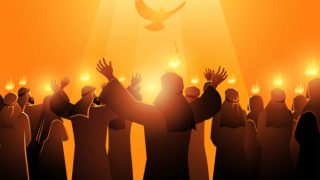
THE BETHLEHEM CANDLE: A SYMBOL OF PEACE
HOMILY FOR SECOND SUNDAY OF ADVENT, YEAR A. Reading: Isaiah 11:1-10;Psalm 72; Romans 15:4-9 and Matthew 3:1-12. THE BETHLEHEM CANDLE: A SYMBOL OF PEACE
This Sunday we light the second candle of the Advent wreath, which is known as the Bethlehem Candle, a symbol of peace. Like the prophet’s Candle, the Bethlehem Candle is purple in colour, which liturgically signifies repentance and royalty. This Candle helps us recall the preparation Mary and Joseph made before the birth of Jesus Christ, travelling from Nazareth to Bethlehem for the first population census, in order to fulfill the words of the prophet.
The parents of Jesus lived in Nazareth, but God wanted His promises to be fulfilled and so used the Emperor Caesar Augustus, who issued a decree that a census be taken of the entire Roman world. This made Joseph go up from the town of Nazareth in Galilee to Judea, to Bethlehem the town of David (his ancestral town), to register with Mary who was betrothed to him and was expecting a child (Luke 2:1-7). God had earlier spoken through His prophet Micah saying, “But you O Bethlehem, though you are small among the clans of Judah, out of you will come for me one who will be ruler over Israel, whose origins are from of old, from ancient times” (Micah 5:2).
In the first reading, Isaiah gave a prophecy of the coming of Christ when he said; “There shall come forth a shoot from the stump of Jesse, and a branch shall grow out of his roots” (Is 11:1). In this, Isaiah foretells the historical lineage of Christ coming from a royal family as the purple candle of today indicates royalty. Similarly, the beginning of Matthew’s gospel presents to us the genealogy of Christ, tracing his royal family to David, son of Jesse and by extension to Abraham (Mt 1:1-17).
This verse brings to mind Isaiah’s earlier promise on the survivals of Israel (4:2). Isaiah prophesied the Assyrian invasion (8:1-15), describing how God used the Assyrians like a stick in his hand to correct Syria, Israel and Judah, which brought about judgment and destructions of Israel (9:8-10:4). He also prophesied about the demise of Assyria (10:1-19) and promised “A remnant will return, even the remnant of Jacob, to the might God” (10:21). However, before that take place, Israel will experience judgment, the Lord of host “Will lop the boughs with terrifying power; the tallest tree will be cut down, and the lofty will be brought low. He will cut down the thickets of the forest with iron, and Lebanon will fall by the mighty one” (10:33-34). This anticipates the devastation of the Holy City. This devastation, this lopping and cutting down, will prepare the way for new life to emerge, which is the shoot that will come forth from the stump of Jesse. Indeed, Christ did come from the stump of Jesse. The royal authority of the house of David was dormant for six hundred (600) years when Christ came as King and Messiah (the period the stump got dried: the Davidic dynasty). When He came, it was like a new green Branch coming from an apparently dead stump. The Lord wanted Judah to know that even though the Assyrians and others would come and bring judgment, God would still use them and bring forth life from them. Even if they looked like a long-dead stump, God could bring forth life. Invariably, even when our situation seems terrible and bad, God can restore us back to life.
Isaiah also tells us of how his reign and project will be like, that he (the Messiah) will rule with justice and equity, “He shall not judge by what his eyes see, or decide by what his ears hear…” (11:3). In view of this that the psalmist says, “In his days shall justice flourish and great peace forever” (Ps 21:7). Isaiah also emphasizes that the reign of Christ shall restore peace and harmony among the Israelites, using the imagery of animals, “That the wolf shall dwell with the lamb, and the leopard shall lie down with the kid, the calf, and the lion fatling together, and little child shall lead them” (Is 11:6-9).
In light of restoring peace and harmony to Israel, the gospel from Matthew presents the preaching of repentance and the baptism of John the Baptist. His message underscores the importance of the Advent Season, “Repent, for the kingdom of heaven is at hand” (Mt 3:2). The call to repentance was the response to the news that the Messiah is coming. This repentance is fundamental turnarounds from sin, involving mind and action. It involves new direction, change of heart and new commitment. John also reiterates the words of the prophet in Isaiah 40:3, “Prepare the way for the Lord, make his part straight” (Mt 3:3). By this, John was identified as the forerunner of the Messiah, to prepare the arrival of the majestic King. The real preparation must take place in our hearts.
While John was preaching and baptizing in the river Jordan, he saw the Pharisees and Sadducees coming for baptism and he said to them, “You brood of vipers!” Why will John address them as brood of vipers? ‘Brood’ has a Germanic origin related to breed young ones or to nurse young ones. It has a figurative use of hen nursing chick under her wings. ‘Vipers’ belong to the family of serpents and are venomous. So John was essentially calling the religious leaders deadly sons of the serpent. They think of themselves as righteous, so why would they come for John’s baptism? Later, Christ will say to the chief priest and elders (most of whom are Pharisees and Sadducees) “For John came to you in the way of righteousness and you didn’t believe him, but the tax collectors and prostitutes believed him. When you saw it, you didn’t even repent afterward, that you might believe him” (Mt 21:32). John warns them to stop trusting on their Jewish heritage of having Abraham as their father. It is important that they truly repent and not simply trust in Abraham’s merits.
As today’s liturgy calls us to repentance, let us ask ourselves: do we make part of the family/brood of vipers or the sons of the serpent? In Genesis 3, the Scripture associate the serpent with Satan, and so, the Pharisees and Sadducees bore satanic qualities that made John reprimand them. In John 8:34, Christ said, “The unbelieving Jews belong to their father the Devil. They take pleasure in bringing harm and wickedness to others.” Based on this that John calls for repentance, and so, let us stop wickedness and prepare our hearts to welcome Christ this Christmas. When we have Christ, we have peace. Maranatha!
God bless you!
Fr. Ken Dogbo, OSJ










